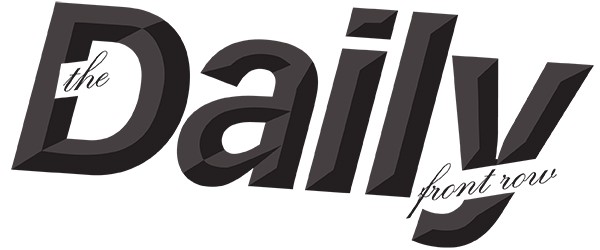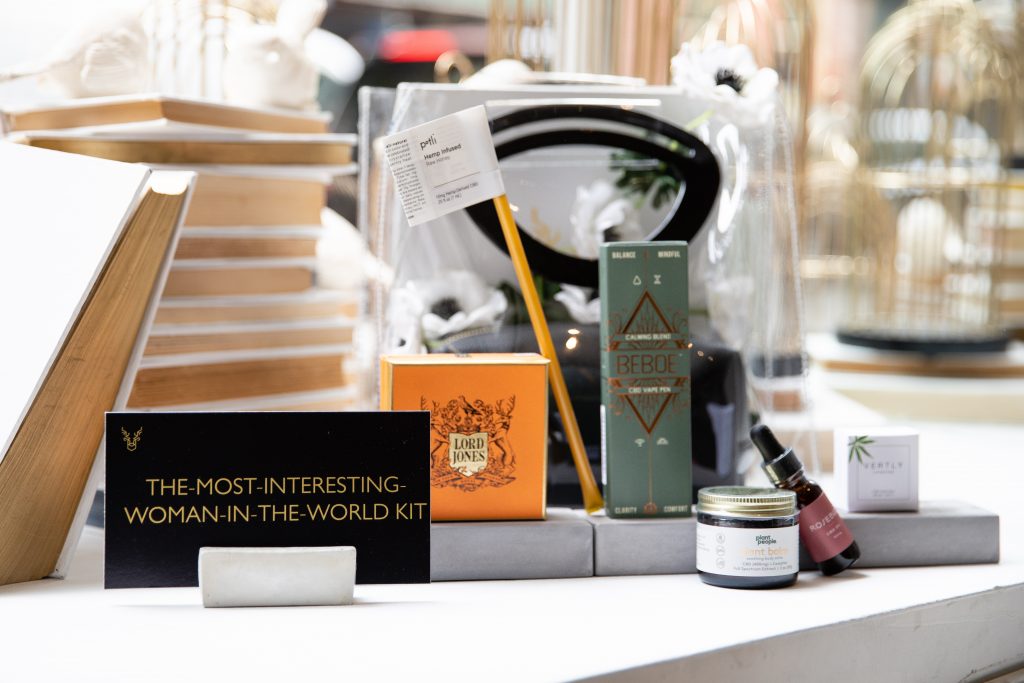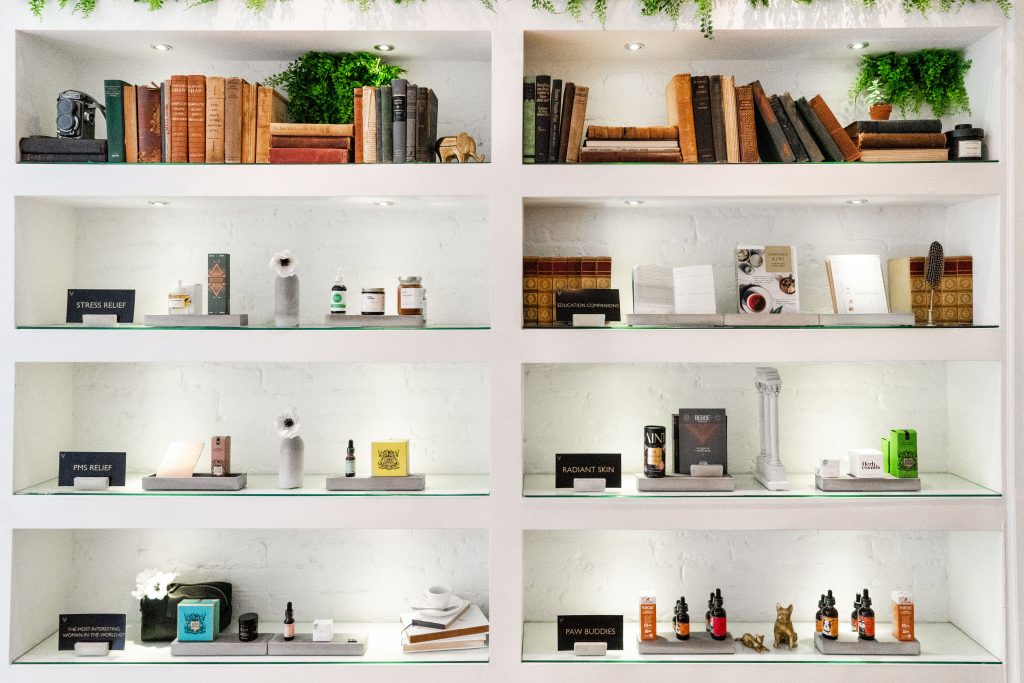Faced with isolation for a few more weeks many of us are starting to really crawl the walls, and we could use a moment to just chiiiillllllll. Meet your new best friend, CBD! Virtually calorie free, this miracle treatment is far better than consuming that 100th bottle of wine to zen out, for so many reasons. We chatted with Wendy Nguyen, OG of Wendy’s Lookbook and founder of Artemis, a premier CBD shop in the West Village, to get the scoop on what we should use and how!
What is CBD exactly and how is it different from THC?
CBD is cannabidiol and THC is tetrahydrocannabinol. These two cannabinoids are the most prevalent compounds found in the cannabis and hemp plant. The classification between a hemp plant and a cannabis plant is that the hemp plant contains less than 0.3% THC while the cannabis plant contains higher concentrations of THC.
THC produces an intoxicating effect, and CBD is non-intoxicating thus it does not produce the ‘high’ the way THC does. When a CBD product is listed as ‘full spectrum,’ it means that there is less than 0.3% THC in it. When it’s listed as a ‘broad spectrum’ or ‘isolate’ product, it means that there is no THC in it. In the late 90’s, professors Raphael Mechoulam and Shimon Ben-Shabat posited that CBD and THC together, thus a full spectrum product, is often more efficacious than their isolated components, thus an isolate product (Mechoulam and Ben-Shabat, 1999).
What are some ailments that can be treated using CBD? Anxiety, sleep problems, general body issues (cramps, etc.)?
The reason why CBD is used to treat so many different ailments is that CBD effects many different receptor systems. CBD indirectly effects our endocannabinoid system, which is involved in regulating pain, stress, sleep, and more. CBD also directly activates the serotonin receptor producing an anti-anxiety effect (de Mello Schier AR, 2014;13(6):953-60), and the vanilloid receptors which influences pain perception and inflammation (Br J Pharmacol. 2004 Sep; 143(2): 247–250). When I first started using CBD, I researched and wanted to understand the science behind the compound. And from there, I had a better understanding of how CBD affects anxiety, sleep, and pain.
What forms does CBD come in and how do they differ?
CBD comes in many delivery methods. The most common are tinctures, edibles, and topicals. Fast-acting and easy to dose, CBD tinctures are take sublingually under the tongue. The active ingredients are absorbed by the blood vessels in the mouth tissues. CBD edibles offer a delayed onset time and longer duration due to the process of passing through the gastrointestinal tract and liver before being absorbed into the bloodstream. CBD topicals are an effective way to treat localized pain. Topicals do not enter the bloodstream, instead they are picked up by the many endocannabinoid receptors in the skin where they are absorbed locally to reduce pain and inflammation.
What’s the right dosage? How long until I feel the effects?
CBD is accumulative and usually the optimal therapeutic dose is achieved (after titrating properly) after two weeks or so. To put this into perspective, probiotics usually takes about 1 to 2 months before seeing results. CBD can take up to 2 weeks or more. For some, the effects can be felt immediately after 1 dose. For others, it might take up to 2 weeks. Everyone’s ‘right dose’ is different. We have clients who feel pain relief at 2.5mg and others at 100mg. It really depends on how your body processes and breaks down CBD. With this being said, CBD is usually more effective when taken every day or every other day.
How have you used CBD on yourself and how has it helped you?
My journey started when I was trying to find natural therapies for my pelvic muscle spasms. Being on antibiotics regularly for 20 years, I developed resistance to most antibiotics and it took a heavy toll on my gut health. I started researching and exploring the option of CBD and other anti-inflammation supplements. I take CBD every day, and went from about 24 pelvic spasm episodes to two last year. I was also diagnosed with depression and PTSD in my teens and early twenties, and still struggle with it every day. Over time, I’ve found that CBD helps me manage my anxiety and PTSD better.
What does a consultation with Artemis look like?
We want to get to know you as a whole person, so a consultation with us includes an allergy check, medications that you’re on that you can’t take with grapefruit, any stomach sensitivity issues, current pain level, your lifestyle, and so on. We’re not doctors so we can’t provide a medical history check, but the more you share the better we can help you navigate the CBD space. So for example — for someone who has trouble sleeping related to anxiety, we would ask (after all of the other questions are asked)… do you have trouble falling asleep or staying asleep? Do you also experience daytime anxiety? From there, we can recommend trying a tincture at a low dose during the day to help manage the daytime anxiety and a larger dose at nighttime to help keep you asleep. We’d also suggest keeping a titration journal to track your therapeutic window.
Now we are seeing products with CBDA. What’s the difference? Will we feel it?
CBDA is the acidic precursor to CBD. CBDA can be found in the live or raw form of the hemp plant. With CBDA, the absorption is 11x more than CBD (Eur J Clin Pharmacol. 2018 Nov;74(11):1427-1436), so CBDA-dominant tinctures are quite powerful. CBDA also interacts more strongly with our serotonin receptors, so we have a lot of clients who use CBDA-dominant tinctures for stress and anxiety relief.
If you had to prescribe a “one size fits all” kit for all of us going through the stresses of COVID, what would it be?
I’d hit three categories in this kit: a tincture, an edible, and a topical. A tincture for daily maintenance covering daytime stress relief to helping us get better sleep. For an edible — CBD infused honey. You can add this to your morning yogurt or nighttime tea to promote relaxation. And a CBD balm for any sore areas — your lower back, your feet, your shoulders.
Subscribe to our newsletter and follow us on Facebook and Instagram to stay up to date on all the latest fashion news and juicy industry gossip.



